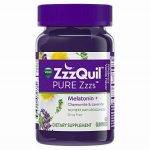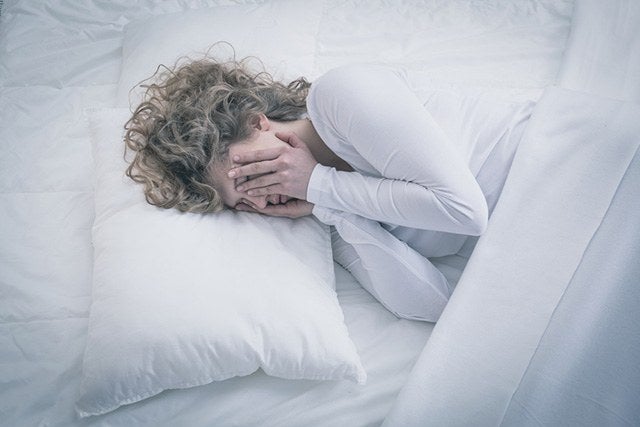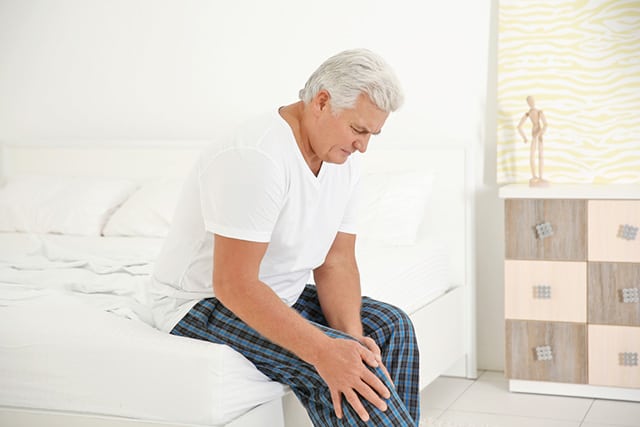What are the Best Sleep Aids for the Elderly?

1. Melatonion – Editor's Choice
- Melatonin supplements act as a natural sleep aid.
- Can be effective even in really small doses.
- Is widely-recognized for its multiple health benefits.
- Side effects are less frequent compared to those given by sleeping pills.

2. Valerian Root
- One of the most common natural sleep aids.
- Can be consumed in several forms.
- Can also help reduce anxiety, by inducing a state of calm.
- It is believed to have multiple side benefits, like improving states of depression, reducing PMS pain and improving ADHD symptoms.

3.
- Can be consumed in tea form or used as a natural essential oil for aromatherapy.
- Chamomile ointment can help soothe insect stings.
- Can help relax the mind and the body.
- Alleviates menstrual cramp pain.
- Can help prevent or treat seasickness.

4. Magnesium
- Works together with melatonin to regulate your circadian rhythm.
- Is available in a lot of food that people consume.
- It is believed that magnesium also reduces stress and irritability.
A natural part of the aging process is experiencing changes in the sleeping patterns. Even If the body feels more tired, elders have a harder time falling asleep and when they do eventually doze off, they can’t manage to stay asleep for too long. Some people think that the body’s need for sleep decreases with age, but that’s nothing more than a myth. Throughout our entire adulthood, the need for sleep is one of the few constants.
Causes of Elderly Sleep Disorders
When psychiatric and medical causes have been ruled out, that means a person suffers from a primary sleep disorder. Insomnia is the most common cause, characterized by difficulty in falling asleep, agitated rest or trouble in maintaining sleep. Sleep apnea is also amongst the primary sleep disorders that causes breathing interruptions while sleeping. Restless leg syndrome is when the sleepers manifest an accentuated need to move his legs during sleep and it’s not to be confused with a periodic limb movement disorder, which is the involuntary movement of the limbs. Another primary sleeping disorder is REM behavior disorder, which causes people to act out dreams when sleeping.

As far as medical conditions are concerned, studies have revealed that people who have trouble sleeping are likely to have conditions such as poor bladder control, lung or respiratory conditions, gastrointestinal and neurological conditions, cardiovascular disease, arthritis pain, Parkinson or Alzheimer.

It’s also frequent for elders to have disrupted sleep patterns caused by medications such as adrenergic drugs (typically prescribed for conditions such as cardiac arrest or asthma attacks), levodopa (Parkinson’s disease medication), H2 blockers, antidepressants, corticosteroids, antihypertensive drugs, anticholinergics or diuretics.
Diagnosis
In order to diagnose a sleeping disorder, it’s necessary to be examined by a doctor in order to determine the root of the problem. It’s not uncommon for doctors to ask their patients to complete a sleep diary for a couple of weeks, so he can understand your sleeping pattern better. If the doctor thinks that you suffer from a primary sleep disorder, he could ask for you to take a sleep study or a polysomnogram. Sleep studies are typically performed in a sleep lab. With the help of sensors, the technician will analyze and measure your body’s movements, your breathing, brain activity, and heart rate.
In some cases, behavioral therapy is recommended in the detriment of medication. The period to undergo therapy will vary depending on the needs of every individual and it’s a combination between stimulus control and sleep education. In order to prevent sleep disorders in elderly, it’s recommended to take extra measures, such as avoiding naps during the day, avoiding powerful lights before getting into bed, engaging in relaxing and quiet activities prior to sleeping (such as reading), and especially going to bed and waking up at the same time each day.
Side Effects of Sleeping Pills
For quite some time, people have turned to medication the second they felt sick or troubled. It is one of the fastest ways to solve a health-related problem, but it’s not always the best one. People are tempted to take medication by heart, without consulting a doctor to see if there is a better solution or if some other meds are needed. Sleeping pills are only to be administered after a medical examination when a doctor has determined the cause of the sleep disorder. However, they should only be prescribed as a short-term remedy, especially since elders are more likely to be exposed to the side effects of such medication.
Sleeping pills can increase nausea and dizziness, causing the elderly to fall down on a more frequent basis. They can also cause dependence if they are administered for longer periods of time. The topic of sleep drugs for the elderly is not to be taken lightly. Since sleeping pills are sedative-hypnotic drugs, they pose greater risks in people of older age. As the body gets older, it becomes more difficult for the system to eliminate these drugs. This, in turn, can lead to memory loss and confusion.
You may be interested in: Everything You Need to Know About Melatonin Supplement Side Effects
Sleep-Promoting Foods for the Elderly
There’s no therapy like food therapy. It’s a well-known fact that eating good food releases the happiness hormone, so what if there was a way to combine the pleasant and the useful? Oh wait, there is actually food that can help elderly people sleep better!
Fruits that are rich in nutrients, with minerals such as magnesium and potassium can help relax muscles and induce a state of calm, turning down the nervous system. Bananas are a great example of a fruit that’s rich in both those things. Aside from that, bananas contain tryptophan, which is an amino acid that induces sleep, as our bodies convert it into melatonin and serotonin. And speaking of melatonin (you know, the hormone that gets out body ready for bed), did you know that cherries are a very rich source of melatonin? Salmon will help you get a better night’s sleep because it gives you the much-needed omega-3 fatty acid.

Best Sleep Aids for the Elderly Reviews
1. Melatonin – Editor's Choice

Highlights
- Administration: 0.5 mg or 1 mg 30 minutes before going to bed
- Product Recommendations: Vicks ZzzQuil PURE Zzzs Melatonin, Best Naturals Melatonin, OLLY Restful Sleep Gummy Supplement with Melatonin
Pros
- Melatonin supplements act as a natural sleep aid.
- Can be effective even in really small doses.
- Is widely-recognized for its multiple health benefits.
- Side effects are less frequent compared to those given by sleeping pills.
Cons
- Can cause minor side effects, like nausea or dizziness.
Melatonin is more than just a natural sleep aid: it’s a hormone that’s naturally found inside your body, produced by your pineal gland. When your melatonin levels are high, you find it easier to fall asleep. It’s not directly responsible for your sleepiness, but it lets your body know that it’s time for bed. Elderly people take melatonin supplements because it can help with insomnia, although it’s also a common remedy for people who suffer from jet lag. Another benefit of melatonin is the fact that it acts as an antioxidant as well.
As nighttime approaches, the melatonin levels in your body start to rise, working together with your body’s circadian rhythm (call it the body’s internal clock, if you will) to let you know it’s bedtime. The reason why it’s recommended for you not to stay exposed to light before going to bed is that high levels of light suppress the production of melatonin and indicate that it’s time to wake up, rather than go to bed. Intuitively, just as high melatonin levels help you fall asleep, low melatonin levels will cause you to struggle when trying to snooze.
Aside from the sleeping benefits, melatonin also has a number of other properties that can help treat other health-related problems. Because of its antioxidant properties, melatonin can help in treating heartburn and stomach ulcers. Since it acts as a natural sleeping aid, it’s also considered to be a booster for hormone growth in younger men.
When taking melatonin supplements, it’s always important to start off with smaller doses (like 0.5 mg half an hour before going to bed) and increase them if you notice they’re not helping you fall asleep (but don’t take more than 5 mg at once). Beyond this point, it’s unlikely that a higher dose of melatonin will actually help you fall asleep faster. Most supplements have their own set of instructions on how to administer the product, so make sure you pay attention to whatever is written on the recipient.
2. Valerian Root

Highlights
- Administration: depends on the form (can be consumed as tea, capsules, pills or tinctures)
- Product Recommendations: Valerian Sleep Aid, Sleep Aid – Sleeping Pills with Valerian Root
Pros
- One of the most common natural sleep aids.
- Can be consumed in several forms.
- Can also help reduce anxiety, by inducing a state of calm.
- It is believed to have multiple side benefits, like improving states of depression, reducing PMS pain and improving ADHD symptoms.
Cons
- Should not be administered together with alcohol or sedatives.
Valerian herbal supplements have been around for quite some time, as people have used valerian as a natural sleep aid, but also as a method to reduce anxiety and stress levels. The use of valerian as a natural remedy has been around since the times of Romans and Greeks, who use to make medicinal tea out of valerian. Today, the plant is part of dietary pills, anxiety remedies, and tea bags that, once brewed, can induce a natural state of sleepiness.
How exactly does that work? Valerian stimulates the brain’s GABA receptor, which is a neuro-gateway for chemicals that induce sleep. However, there isn’t any precise scientific information that explains how exactly valerian affects our neurological path. Yet, it is considered to be one of the best, if not THE best natural sleep aid. Other inconclusive studies have shown that valerian was able to improve the sleep latency and quality of people who suffered from mild insomnia. This manifests itself in various forms: difficulty in falling asleep, waking up in the middle of the night, disruption in the natural sleep cycle or the inability to return to sleep. Valerian reduces sleep latency, but the evidence so far has shown that it could take up to four weeks of use before there are any noticeable effects.
But even natural sleep aids can produce a series of side effect. When used for a short period of time, valerian is not at all threatening to the organism. It should be avoided by people who are allergic to it. Sometimes, it can lead to having an upset stomach, nausea, heart disturbances or even headaches. Higher doses of valerian can lead to fatigue the next day and, in some cases, it leads to dry mouth and vivid dreams.
3. Chamomile

Highlights
- Administration: general oral doses vary from 1,1 to 15 g/day
- Product Recommendations: Chamomile Tea, Roman Chamomile Essential Oil
Pros
- Can be consumed in tea form or used as a natural essential oil for aromatherapy.
- Chamomile ointment can help soothe insect stings.
- Can help relax the mind and the body.
- Alleviates menstrual cramp pain.
- Can help prevent or treat seasickness.
Cons
- Can increase bleeding in people who take blood-thinning medications.
The beautiful daisy flower is good for more than just a soothing cup of tea: it can relax both the body and the mind and induce that calm state that will slowly send you off to dreamland. There are two main types of chamomile: German and Roman. The former is considered to be more effective than the other, and it is frequently used in several forms for human consumption. Chamomile tea has been consumed to relax the body for quite some time now. Since it acts like a mild sedative, it’s also a good remedy for menstrual cramp pain. Because of this effect, people also tend to believe that it can help reduce anxiety levels, although there aren’t any scientific studies to back up this claim.
Chamomile tea is also used to help reduce gas or prevent seasickness. Some people like to drink it when they have an upset stomach, while others have high faith that it can reduce colic pains in babies. One thing’s for sure: aside from being a good natural sleep aid, chamomile tea is also a good remedy for cold, as it can reduce nasal passage inflammation and mucus accumulation, which also makes it a viable treatment for those who suffer from allergies.
Just like with other natural sleep aid, chamomile can also produce a series of side effects. While they are not likely to occur, it’s always important to remember that elderly people have more sensitive organisms and health issues that could increase the odds of these side effects to occur.
Chamomile tea can sometimes cause swelling in the throat, as well as shortness of breath and allergic reactions. It’s important to note that if you are allergic to other plants in the daisy family, there are chances of you being allergic to chamomile as well.
4. Magnesium

Highlights
- Administration: daily intake of 400-420 mg of magnesium (adult men); 310-360 mg (adult women)
- Product Recommendations: High Absorption Magnesium Complex, High Absorption Magnesium
Pros
- Works together with melatonin to regulate your circadian rhythm.
- Is available in a lot of food that people consume.
- It is believed that magnesium also reduces stress and irritability.
Cons
- Too much magnesium can also lead to sleeping disorders.
- Common side effects are nausea and diarrhea.
Having a balanced intake of minerals is not only going to help you sleep better, but it gives the organism all the necessary tools to build a healthier body. Magnesium is one of those minerals which is essential for staying healthy. It’s commonly found in our red blood cells, as well as our serum. It can help lower blood pressure, while also improving sleep quality. Magnesium interacts with our melatonin levels, helping out body tune it down as sleep hours approach. Melatonin and magnesium levels seem to be correlated, so scientist have concluded that magnesium is also related to our body’s circadian rhythm.
When you have a magnesium deficiency, the body is more likely to push you through episodes of insomnia. On the other hand, it is also possible to suffer from sleep disorders if your body has too much magnesium. As with everything else, balance is crucial. Finding the right amount of magnesium for your body not only helps you fall asleep faster, but it also improves the quality of your sleep. Taking a daily dose of magnesium can help you bring balance to your nervous system, which reduces the levels of stress and irritability. Because you can get a healthy dose of magnesium just by eating the right food, there aren’t very specific dosage guidelines for magnesium as a sleep aid.
According to information given by the Food and Nutrition Board, men and women need different doses of magnesium to keep their levels balanced. However, if you plan to use magnesium as a sleep aid, you should take about one or two hours before going to bed. Nausea or diarrhea are some of the side effects caused by magnesium. It’s recommended not to take magnesium on an empty stomach and always check with your doctor to see if there are any interaction between magnesium and some other medication you might be taking.
Conclusion
You may be interested in: Best Melatonin Supplement That’s Safe for Children
Recognizing and treating sleep deprivation in the elderly is critical in preventing a series of other health problems. It’s no secret that a good night’s sleep helps the body regenerate and gives us energy. It also helps improve senior’s quality of life, on both a physical and a mental level. As with every other age, sleep deprivation in the elderly causes fatigue during the next day, which is exponentially increased by an organism that gets weaker as the years pass. A lot of elders reported that the difficulty is not necessarily in falling asleep, but rather in staying asleep. Sometimes, it’s best to try behavioral therapy, as medication can have side effects.
Of course, there are other means to helps the elderly get a better night’s sleep aside from taking natural sleep aids. Sleep hygiene, a proper diet, supplements with vitamins and mineral and even a properly ventilated room can highly contribute to the quality of one’s sleep.
